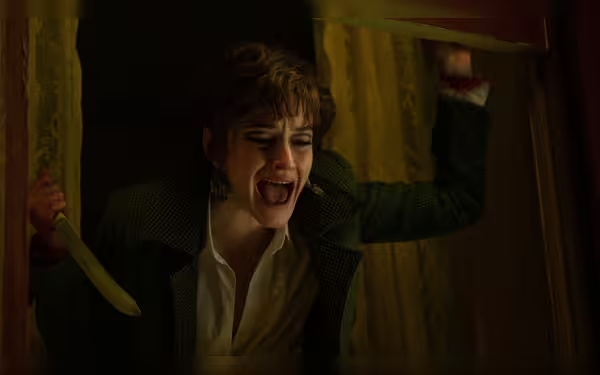Saturday, November 16, 2024 09:23 PM
Apartment 7A: A Horror Film Reflecting Women's Reproductive Rights
- Explores women's autonomy and reproductive rights.
- Follows Terry's journey in a sinister apartment.
- Combines horror with a political message.
 Image Credits: ign_pk
Image Credits: ign_pkApartment 7A explores women's reproductive rights through horror, following Terry's journey in a sinister apartment.
"Apartment 7A" is a new film that will be available for streaming on Paramount+ starting September 27, 2024. This movie is the third in a series of films that explore the theme of a young woman who becomes pregnant against her will, this time by the devil. The other two films in this trend are "Immaculate" and "The First Omen." The reason this topic is so important today is because many women in the United States are facing serious challenges regarding their reproductive rights. Some women are being forced to continue pregnancies they do not want, and tragically, some are even losing their lives in the process. This film, like its predecessors, combines elements of horror with a strong political message about control and coercion over women's bodies.
Unlike the other two films, which were shown in theaters, "Apartment 7A" is going straight to streaming. This decision does not reflect the film's quality or star power, as it is a follow-up to the classic horror film "Rosemary's Baby." The story takes place in the same universe, focusing on a woman named Terry Gionoffrio, played by Julia Garner. Terry is an aspiring Broadway star who moves into a rent-free apartment offered by her new neighbors, Minnie and Roman Castevet, played by Dianne Wiest and Kevin McNally. Although they seem friendly, their intentions are questionable, and Terry's naivety leads her to overlook several warning signs.
The film's director, Natalie Erika James, has crafted a visually striking experience, blending colorful Art Deco aesthetics with a darker, more somber tone in other scenes. While the film does include some body horror elements, such as the sound of Terry injuring her foot during a performance, it does not reach the extreme levels of grotesqueness found in other horror films. Instead, the choreography is reminiscent of famous choreographer Bob Fosse, adding a unique flair to the dance sequences.
As the story unfolds, Terry discovers she is pregnant after a one-night stand with a stage director named Alan Marchand. The film effectively portrays the oppressive atmosphere surrounding her, highlighting the lack of choices available to her and the expectations placed on her by those around her. This theme resonates strongly with the current climate in the United States, where many women are grappling with similar issues regarding their autonomy and reproductive rights.
In its final moments, "Apartment 7A" hints at a more radical message about women's freedom, as Terry weighs her options between accepting single motherhood or making a deal with the devil. However, the film is ultimately constrained by the fate of its character in "Rosemary's Baby," limiting its ability to fully explore these themes. Despite its shortcomings, the film remains relevant and thought-provoking, reminding viewers of the ongoing struggles women face regarding their bodies and choices.
"Apartment 7A" is not just a horror film; it is a reflection of the societal issues that continue to affect women today. While it may not deliver the most intense scares, it offers a compelling narrative that encourages viewers to think critically about the implications of control and autonomy in women's lives. As we navigate the complexities of reproductive rights in the modern world, films like this serve as important reminders of the battles that still need to be fought.













